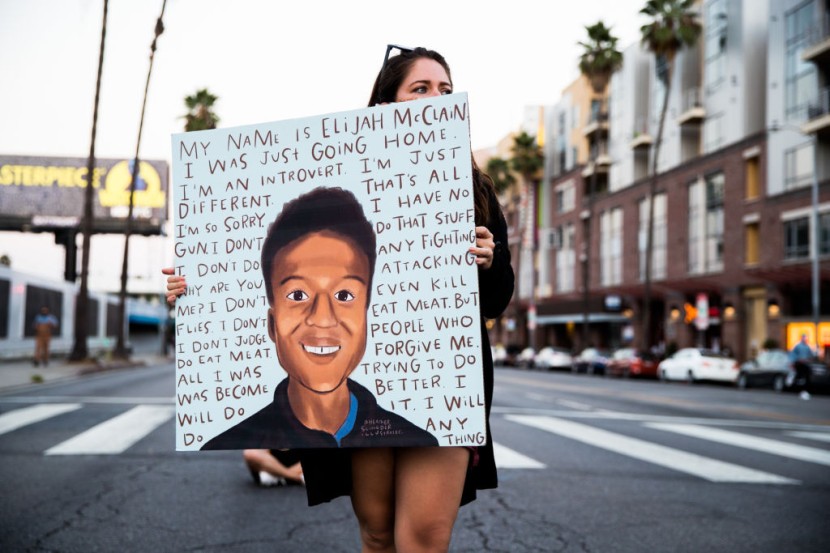
On Thursday, prosecutors began their trial of two Denver police officers accused of killing Elijah McClain, a young black man paramedic held in a neck hold and gave a strong sedative.
This case, which garnered widespread attention and sparked calls for police reform, marks the first in a series of trials related to McClain's tragic demise, as per Reuters
Trial Commences for Denver Officers in Elijah McClain's Controversial Death
During their opening statements on Wednesday, lawyers from opposing sides presented divergent narratives of the fatal encounter after McClain was stopped by police in Aurora. Prosecutors argued that officers Randy Roedema and Jason Rosenblatt disregarded McClain's pleas of "I can't breathe" and failed to adhere to their training.
On the other hand, defense attorneys contended that the officers bore no responsibility for McClain's death, blaming the paramedics instead. The officers encountered McClain, a 23-year-old massage therapist, as he walked home from a convenience store on August 24, 2019, carrying only his phone and a plastic bag containing three cans of iced tea.
A 911 caller had reported him as sketchy. Prosecutors aim to convince the jury that the stop was unwarranted, challenging the notion that McClain's injuries resulted from the officers' lawful actions. Roedema and Rosenblatt face charges of criminally negligent homicide, manslaughter, and assault.
They have pleaded not guilty and have yet to address the allegations publicly. The trial is anticipated to span approximately one month. A third officer and two paramedics are also implicated in McClain's death and are slated for separate trials later this year.
An investigation established that ketamine, a potent sedative, played a pivotal role in McClain's demise. This revelation prompted a reevaluation of ketamine's use on individuals perceived as behaving erratically, leading Colorado's health department to impose restrictions on its administration by emergency personnel.
In 2020, the state's legislature banned using neck holds by law enforcement. Prosecutor Jonathan Bunge asserted that the officers violated department policies by employing excessive force against McClain, an unarmed individual, and failing to de-escalate the situation.
He played police body camera footage, emphasizing McClain's repeated pleas for help, saying, "Listen to Elijah's words. When Elijah is on the ground handcuffed, he's saying over and over and over again, 'I can't breathe. Please help me.'"
Bunge also described how McClain vomited repeatedly after being placed in a neck hold, subsequently choking and experiencing cardiac arrest.
He argued that administering the sedative was the last thing McClain needed. Roedema's attorney, Reid Elkus, contended that the officers' actions were consistent with department policies and training, according to Independent.
Read also : Authorities Find Romeoville Family Murder Suspects Shot in Oklahoma Days After Horrific Killings
Defense Cites 'High-Crime Area' for McClain's Stop, Blames Paramedics in Trial
Elkus emphasized that McClain was stopped in a "high-crime area," the officers repeatedly instructed him to halt before he complied. He pointed to the paramedics as the individuals responsible for McClain's death, stating that they administered an excessive dose of ketamine.
Rosenblatt's attorney, Harvey Steinberg, argued that the officers had no choice but to detain McClain after the 911 call. He asserted that McClain displayed continued resistance after being stopped, prompting the officers to respond accordingly.
Steinberg urged jurors to remain impartial and avoid allowing emotions or sympathy to influence their judgment.
McClain's mother was present in the courtroom during the opening statements, and her emotional reaction underscored the gravity of the case.
Family members of the two officers and other Aurora police officers also attended the proceedings.
The jury, comprising 12 jurors and 2 alternates, appeared predominantly white.
Charges were not filed until two years after McClain's death, coinciding with a nationwide reckoning over racial injustice in American policing following the murder of George Floyd by Minneapolis police officers.
A local district attorney, Dave Young, had initially called McClain's death "tragic" but opted not to prosecute the officers, citing uncertainty regarding the exact cause of death as determined by the coroner's office.
A revised autopsy report issued in 2021 concluded that McClain died from "complications of ketamine administration following forcible restraint."
The report, informed by a grand jury investigation, found that McClain had received an overdose of ketamine due to his smaller size, leading to a fatal outcome. Notably, charges were not brought against the officers until two years after McClain's death. Initially, the local district attorney cited the inability of the coroner's office to determine the exact cause of McClain's death as a reason for not prosecuting the officers.
However, a revised coroner's report issued in 2021, based partly on information from a grand jury investigation, identified ketamine as a critical factor in McClain's death. The pathologist also couldn't rule out whether the stress of being held down by the officers contributed to McClain's demise, News Today reported.








